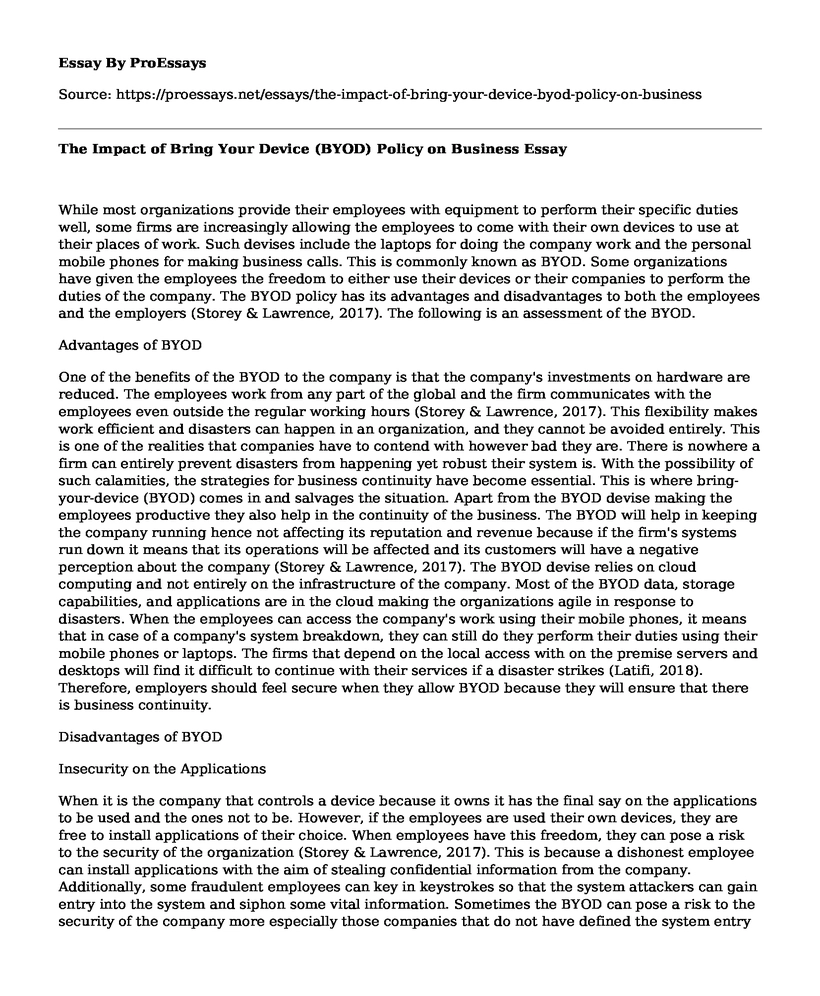While most organizations provide their employees with equipment to perform their specific duties well, some firms are increasingly allowing the employees to come with their own devices to use at their places of work. Such devises include the laptops for doing the company work and the personal mobile phones for making business calls. This is commonly known as BYOD. Some organizations have given the employees the freedom to either use their devices or their companies to perform the duties of the company. The BYOD policy has its advantages and disadvantages to both the employees and the employers (Storey & Lawrence, 2017). The following is an assessment of the BYOD.
Advantages of BYOD
One of the benefits of the BYOD to the company is that the company's investments on hardware are reduced. The employees work from any part of the global and the firm communicates with the employees even outside the regular working hours (Storey & Lawrence, 2017). This flexibility makes work efficient and disasters can happen in an organization, and they cannot be avoided entirely. This is one of the realities that companies have to contend with however bad they are. There is nowhere a firm can entirely prevent disasters from happening yet robust their system is. With the possibility of such calamities, the strategies for business continuity have become essential. This is where bring-your-device (BYOD) comes in and salvages the situation. Apart from the BYOD devise making the employees productive they also help in the continuity of the business. The BYOD will help in keeping the company running hence not affecting its reputation and revenue because if the firm's systems run down it means that its operations will be affected and its customers will have a negative perception about the company (Storey & Lawrence, 2017). The BYOD devise relies on cloud computing and not entirely on the infrastructure of the company. Most of the BYOD data, storage capabilities, and applications are in the cloud making the organizations agile in response to disasters. When the employees can access the company's work using their mobile phones, it means that in case of a company's system breakdown, they can still do they perform their duties using their mobile phones or laptops. The firms that depend on the local access with on the premise servers and desktops will find it difficult to continue with their services if a disaster strikes (Latifi, 2018). Therefore, employers should feel secure when they allow BYOD because they will ensure that there is business continuity.
Disadvantages of BYOD
Insecurity on the Applications
When it is the company that controls a device because it owns it has the final say on the applications to be used and the ones not to be. However, if the employees are used their own devices, they are free to install applications of their choice. When employees have this freedom, they can pose a risk to the security of the organization (Storey & Lawrence, 2017). This is because a dishonest employee can install applications with the aim of stealing confidential information from the company. Additionally, some fraudulent employees can key in keystrokes so that the system attackers can gain entry into the system and siphon some vital information. Sometimes the BYOD can pose a risk to the security of the company more especially those companies that do not have defined the system entry and exit points and the channels through which the data flows (De & Martinelli, 2017). Equally, the companies without regular risk assessments to identify the firm's system vulnerabilities need to be worried about their security.
If an employee's device gets stolen or gets lost, the confidential data of the company can be accessed by unauthorized persons who may use it for malicious intentions. This will be detrimental to the company. Since more than one person sometimes accesses most devices used by employees while out of their places of work by people such as spouses, it is a risk to the confidential data of the company which might be accessed (De & Martinelli, 2017). Only the authorized people should access company data.
Conclusion
Though the BYOD policy is beneficial to both the organization and the employees' policies need to be put in place on its operation because the risks posed by the policy outweigh the disadvantages. Therefore companies need to come up with stringent policies to prevent essential data from being accessed by people who are not authorized.
References
De, C. V. S., & Martinelli, F. (2017). ICT Systems Security and Privacy Protection: 32nd IFIP TC 11 International Conference, SEC 2017, Rome, Italy, May 29-31, 2017, Proceedings. Cham:Springer International Publishing, 2017.
In Latifi, S. (2018). Information Technology - New Generations: 14th International Conference on Information Technology. Cham: Springer International Publishing: Imprint: Springer, 2018.
Storey, G. S., & Lawrence Technological University. (2017). An empirical analysis of bring-your-own-device (BYOD) policy adoption in organizations. Dissertation:D.B.A. Lawrence Technological University 2017
Cite this page
The Impact of Bring Your Device (BYOD) Policy on Business. (2022, Oct 10). Retrieved from https://proessays.net/essays/the-impact-of-bring-your-device-byod-policy-on-business
If you are the original author of this essay and no longer wish to have it published on the ProEssays website, please click below to request its removal:
- Globalizing Capital Book Review
- How Egyptian Art Characterized Egyptian Civilization Paper Example
- Perceived Employable Soft Skills Between Employers and MBA Students Paper Example
- Essay Example on Continually Raising Quality of Service: Strategies for Effectiveness
- Essay Example on Living a Fulfilling Life: Examining Play, Love, Health, and Work
- Free Report Sample on Capitalism Based on Free-Enterprise and Freedom of Contract
- Paper Example on Unraveling Fraud in Banking: A Case Study of Kweku Adoboli's Illegal Trading at UBS







